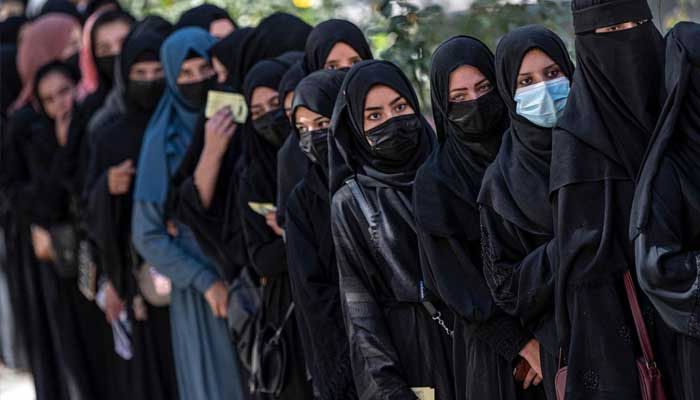Battle for privacy
This criminal behaviour extends to places dedicated to protection of women who have nowhere else to turn
With all the constant interference over their choices and lives, down to the minutest aspects such as clothing, there are likely few things that Pakistani women value more than being left alone. Sadly, the other half of the country and, in some cases, even other women are unlikely to give them that peace of mind. And the constant monitoring and policing extends into even the most private spaces. A statement released last Friday (June 7) by the Digital Rights Foundation points to the ongoing surveillance of women and girls in private spaces through unregulated CCTV cameras in women’s shelters, hostels, universities and salons. This is a gross violation of privacy in a country where women have little enough of it to begin with. Shockingly, this criminal behaviour extends to even places dedicated to the protection and safety of women who have nowhere else to turn. The statement highlights recent incidents of such criminal surveillance at a Darul Aman in Rawalpindi and a women’s hostel in Lahore where hidden cameras were found on the premises. This is not the first time reports of women being secretly surveilled or digitally monitored without their consent have surfaced in the country. In 2019, students from University of Balochistan (UoB) protested after CCTV camera footage was used by security personnel to sexually harass and blackmail students, particularly young women on campus.
One cannot get around the overwhelming sense of irony surrounding this problem. One would think that a country that, in many cases, has made a virtue out of systematically excluding and segregating women from and in public settings would respect their private space. And yet, it is not enough. The need to spy on, sexually harass and blackmail women does not go away when they are indoors and on their own, contrary to what many of them are told. It is also not the case that strangers are the only ones who seek to violate women’s privacy in this way, with the DRF statement highlighting repeated complaints from women about being targeted through surveillance & spyware technologies injected to their devices by individuals who are close to them in order to control and monitor their movements and activities. In some instances images of women are manipulated and doctored through the use of generative AI tools to create deep fakes to harass and intimidate them, a problem that can only get worse given the rapidly rising capabilities and availability of such tools. As such, this pattern of harassment and abuse ought to put an end to all manner of victim blaming. It does not matter what a woman is or is not doing or who she is or is not with, simply existing as a woman appears to open one up to being spied on, bullied and harassed. Of all the complaints the DRF helpline has received since its inception, 16,849 in total from across Pakistan, 58.5 per cent have been from women.
Given how sensitive the state has become to the threats emanating from the digital sphere in recent months, one would expect them to pursue stricter digital privacy and data protection laws to protect women’s privacy online. There is also a need to drastically curtail surveillance of women in places like hostels and university campuses and ensure that such surveillance is not carried out without consent. The way such surveillance has been manipulated and used for sexual harassment and blackmail purposes once again reminds us that those who seek to protect women from unseen threats are often the threat themselves.
-
 Leonardo DiCaprio's Co-star Reflects On His Viral Moment At Golden Globes
Leonardo DiCaprio's Co-star Reflects On His Viral Moment At Golden Globes -
 SpaceX Pivots From Mars Plans To Prioritize 2027 Moon Landing
SpaceX Pivots From Mars Plans To Prioritize 2027 Moon Landing -
 J. Cole Brings Back Old-school CD Sales For 'The Fall-Off' Release
J. Cole Brings Back Old-school CD Sales For 'The Fall-Off' Release -
 King Charles Still Cares About Meghan Markle
King Charles Still Cares About Meghan Markle -
 GTA 6 Built By Hand, Street By Street, Rockstar Confirms Ahead Of Launch
GTA 6 Built By Hand, Street By Street, Rockstar Confirms Ahead Of Launch -
 Funeral Home Owner Sentenced To 40 Years For Selling Corpses, Faking Ashes
Funeral Home Owner Sentenced To 40 Years For Selling Corpses, Faking Ashes -
 Why Is Thor Portrayed Differently In Marvel Movies?
Why Is Thor Portrayed Differently In Marvel Movies? -
 Dutch Seismologist Hints At 'surprise’ Quake In Coming Days
Dutch Seismologist Hints At 'surprise’ Quake In Coming Days -
 Australia’s Liberal-National Coalition Reunites After Brief Split Over Hate Laws
Australia’s Liberal-National Coalition Reunites After Brief Split Over Hate Laws -
 DC Director Gives Hopeful Message As Questions Raised Over 'Blue Beetle's Future
DC Director Gives Hopeful Message As Questions Raised Over 'Blue Beetle's Future -
 King Charles New Plans For Andrew In Norfolk Exposed
King Charles New Plans For Andrew In Norfolk Exposed -
 What You Need To Know About Ischemic Stroke
What You Need To Know About Ischemic Stroke -
 Shocking Reason Behind Type 2 Diabetes Revealed By Scientists
Shocking Reason Behind Type 2 Diabetes Revealed By Scientists -
 SpaceX Cleared For NASA Crew-12 Launch After Falcon 9 Review
SpaceX Cleared For NASA Crew-12 Launch After Falcon 9 Review -
 Meghan Markle Gives Old Hollywood Vibes In New Photos At Glitzy Event
Meghan Markle Gives Old Hollywood Vibes In New Photos At Glitzy Event -
 Simple 'finger Test' Unveils Lung Cancer Diagnosis
Simple 'finger Test' Unveils Lung Cancer Diagnosis




